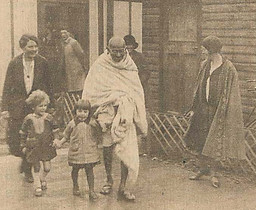

The internationalist and pacifist ethos of Kingsley Hall proved to be controversial following the great loss of life in the war against Nazi Germany.
“There was a lot of hostility at one time. The youth club would sometimes be invaded by a gang who’d got some
silly notionin their heads that we were all pacifists. Sometimes they used to have to close the doors of Kingsley Hall because they would’ve beaten us up… I went to Germany the first time when I was sixteen, and there was still hostility towards us in the streets. When Iwent to Witten old men spat when we walked past.”
James Johnson
Kingsley Hall helped Dagenham residents form friendships and relationships across generations. Many of the clubs and societies who met at Kingsley Hall were founded by members on their own initiative.
In 1932 the Lester sisters asked Sydney Russell to take over running Kingsley Hall. He carried on the pioneering work by co-ordinating extensive building projects, and developed an education and social programme to continue supporting the community ‘from the cradle to the grave’. The strong sense of fellowship fostered at Kingsley Hall has been long lasting and endured even over long distances.
“At the time when we got married, if you lived in Dagenham, you couldn’t get a house in Dagenham,
because the houses in Dagenham were London County Council. As our people got married, they all moved
away from the area, so there was a Young Marrieds weekend that kept them in touch.”
Dennis Riley
Building Bridges
Laying Foundations



Muriel Lester was the worldwide travelling secretary of the International Fellowship of Reconciliation from 1919, and became known as the ‘Mother of World Peace’. Alongside other peace campaigners, such as George Lansbury, Muriel travelled the world promoting pacifism between the two world wars. In recognition of her achievements, Mahatma Gandhi visited Kingsley Hall in 1931.
“My mum used to go to the women’s fellowship, and she said
that this very important man was coming… He came at twelve
o’clock, and it was school dinnertime, so she said, ‘Come and
meet! See this man!’ All I remember is his gaps in his teeth!”
Emily Saville
Mahatma Gandhi on his visit at Kingsley Hall, 1931
Sydney Russell marching with Swedish delegates, Dagenham Town Show, 1953
Emily Saville and another
Camp Fire Girl on a trip, 1944
“I joined the dancing when I was fifteen. This boy came up and said,
‘Would you like a dance?’ And I said, ‘I can’t dance.’ So he said, Come on,
I’ll show you.’ Well, of course, that ended up my husband. He was a Sunday school teacher as well. So we’ve grown up together in Kingsley Hall, and we
married there. When John was born I started Young Mums...We’d never
thought of dancing of an afternoon. Mr Russell said, ‘Won’t go down in
this area.’ So I said, ‘Let’s try.’ And we tried, and we’re still doing it”
Emily Saville
“Only last month I went to Australia to visit one of the people
we put on a special cabaret evening for when they emigrated in 1980-something… He was the captain of the football team at Kingsley Hall, called the Robins. And they were under very, very strict instructions. They weren’t allowed to swear or spit on the pitch! Have you ever met a
footballer that doesn’t swear or spit on the pitch?I think they call it ‘Christianity in Action’, and that’s how it had to be!”
James Johnson